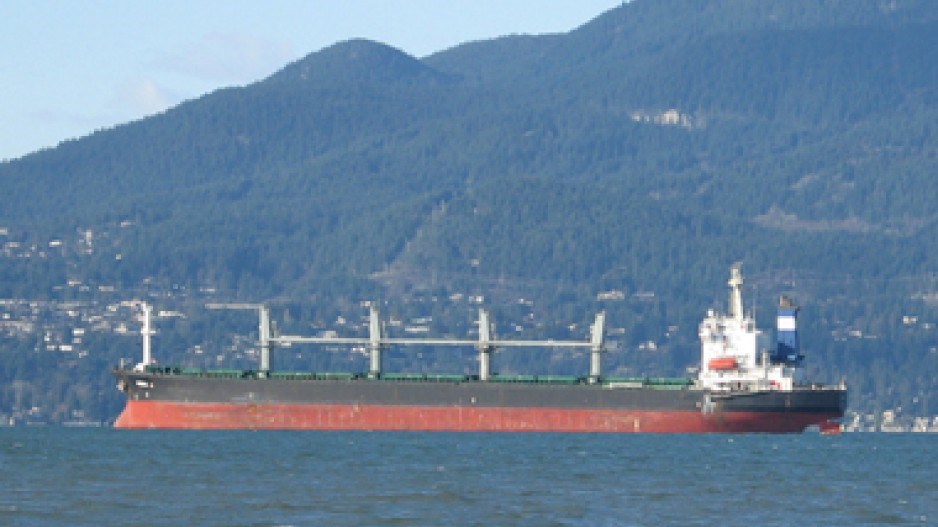Canada has the experience and expertise to handle a doubling of oil tanker traffic on the West Coast if major projects such as Kinder Morgan's twinned Trans Mountain pipeline and Enbridge's Northern Gateway are approved, a sweeping new report has found.
Assessing Marine Transport for Oil Sands on Canada's West Coast was published late last month by Alberta-based consulting firm IHS as part of its Oil Sands Dialogue series.
A number of government departments, including the BC Ministry of Environment, Washington State Department of Ecology and Alberta's Department of Energy, contributed to the report.
Also taking part were numerous oil and gas companies such as BP Canada (NYSE:BP), Imperial Oil (TSX:IMO) and Suncor Energy (TSX:SU).
Jackie Forrest, senior director at IHS, told Business in Vancouver the purpose of the report was to illustrate the regulatory environment present in Canada's marine industry and to provide data on the prevalence and severity of oil tanker spills worldwide.
When asked how a report citing oil and gas companies – corporations with a perceived vested interest in displaying positive tanker data to strengthen the argument for more and larger pipeline projects – could present an objective assessment, Forrest stressed that IHS sought information from varied sources and ensured an arm's length from industry when drafting the paper.
"Our goal is not to make recommendations. We thought we could add value by answering certain questions and by showing how the industry has changed," said Forrest.
"We engaged a broad number of people, not just industry but government. We published independently, and this is our view. Our goal was to present data and facts."
According to the report, the global shipping fleet is made up of 58,800 vessels, of which 10,400 are oil tankers. Total oil tanker capacity is 4.2 billion barrels, nearly double what it was 20 years ago. Large tankers – ships able to carry 600,000 or more barrels of oil – hold almost two-thirds of total oil tanker capacity.
In Canada, nearly 4,000 oil tankers navigate east and west coast waters each year. About 3,500 ship oil in the eastern region, while fewer than 500 visit the west. If the Northern Gateway and expanded Trans Mountain pipelines were approved, an additional 750 tankers per year would come to the west coast. Crude oil is the largest commodity handled in the Canadian maritime industry.
Although the global fleet has expanded, the rate and size of oil spills have not, says the report. In the past decade, 94% of all incidents involving oil tankers have not resulted in a spill. IHS maintains a registry of oil tanker incidents, which includes scenarios ranging from repairing an engine to grounding and fire.
The average amount of oil lost in spills today is 7,200 barrels – a 75% reduction from the average spill 20 years ago.
As classified by IHS, the last major global spill was in 2007 when the Hebei Spirit spilled 82,000 barrels off the west coast of Korea.
IHS attributes the drop in spill volume to improvements in tanker technology. Chief among the improvements: double hulled tankers.
Two decades ago, 93% of all large tankers were single hulled. Today, all tankers carrying crude internationally are double hulled. According to the International Maritime Organization, had tankers always been double hulled, 85% of past spills could have been prevented.
According to the IHS report, Canada is equipped to respond within 72 hours to a spill of up to 75,000 barrels on either coast and is required to clean up to 500 metres of shoreline per day.
For a project such as Northern Gateway, which would introduce tankers larger than three football fields carrying more than two million barrels of oil, the capacity to respond to a spill of 220,000 barrels within 12 hours has been discussed as a potential condition of approval for the pipeline.
But global track record and national response capacity notwithstanding, Joe Spears, Vancouver-based maritime lawyer and co-author of the IHS report, said continued vigilance is vital to ensuring the best pollution response. Everyone affected by a potential spill, he said, should be involved in response preparation, planning and practice.
"This report and having this discussion is a positive thing. We have a good track record – no major incidents," said Spears.
"Because we have a good track record, though, doesn't mean we can ignore response. Canadians can hold their head high, we just need a little bit of polishing and to make sure everyone is brought into the tent. That includes coastal communities, First Nations, whale watchers, everyone. Response is a team sport."




